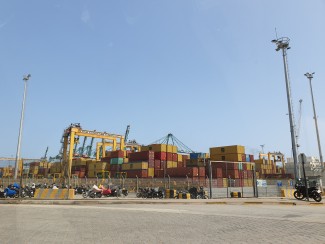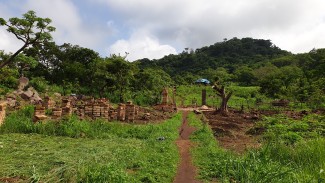Carefully calibrating its trade support and compliance to international standards, country is targeting more exports
Improving an entire country’s business competitiveness is a massive task. While items like access to finance, training, marketing and tariffs may seem to be the major undertakings, another essential element is standards, that is, working to measure both the state of business and a country’s goods the right way.
This is exactly what Lao PDR is doing.
“Our programme has three major pillars. The first is trying to promote deepening trade integration. We became a member of the Association of Southeast Asian Nations [ASEAN] in 1997 and the World Trade Organization [WTO] in 2013, so regionally and globally we need to promote more compliance. The second is to help to build a better business environment. And the third is helping local businesses by promoting competitiveness,” said Phouvieng Phongsa, Deputy Director General in the Department of Planning and Cooperation at the Lao PDR Ministry of Industry and Commerce.
With a unique two-pronged approach starting in 2013, the Ministry has been tackling the country’s measurements difficulties in order to improve the trade situation, in collaboration with the Department of Standards and Metrology (DSM) in the Ministry of Science and Technology and the Enhanced Integrated Framework.
One target was the country’s lack of proper statistical analysis of its business landscape. Today, the first set of quarterly surveys of Lao PDR’s key industries is complete.
The other approach addressed the country’s need for proper laboratories to standardize the measurements of its goods for export. Now, laboratories in Vientiane have trained staff and equipment for electricity, temperature and mass measurements.
And, those three laboratories have been internationally accredited.
SURVEYING THE SCENE
“We had never done a survey or census of industry since the establishment of the Ministry of Industry and Commerce in 2006. Before the project we did our statistics and reports to the Ministry every year but we did it our own way that was not in line with international standards. Now we can see the difference,” said Samly Boutsady, Deputy Director General in the Department of Industry and Handicrafts at the Ministry of Industry and Commerce.
Before going forward, we had to look backward and look at what we had done and what our experience was in order to learn. With our statistics we couldn’t tell the Government what sector of Lao industry was strong and where our weaknesses were.
Samly Boutsady, Deputy Director General at the Lao PDR Ministry of Industry and Commerce
This happened following staff training in statistics procedures, the creation of operations manuals, the establishment of a system for surveying businesses across the country, and the development of a database on the country’s industries. Now, the government has the data in hand to create policy based on the actual business environment across districts and provinces.
“Before going forward, we had to look backward and look at what we had done and what our experience was in order to learn. With our statistics we couldn’t tell the Government what sector of Lao industry was strong and where our weaknesses were. We can now see the main point that for industry in Lao PDR there are six main subsectors and they contribute more than 50% of total production,” Boutsady said.
He added, “That is why it is important that we had this statistics project. Now from these six subsectors we can do a survey to see how to grow total industrial production and we can advise policy makers to draft a policy to promote or to help certain subsectors. That is the benefit.”
MADE TO MEASURE
In complement to the tools the Ministry now has to continue surveying Lao PDR businesses, the other approach addressed the lack of a laboratory for weighing and measuring goods according to international standards.
"We are a member of the WTO and ASEAN, and we need to harmonize our international standards. For example, in the metrology field we are trying to normalize and use the international standard unit… According to the Technical Barriers to Trade [TBT] Agreement we must follow such rules in order to export and import,” said Nisith Khammounheuang, Deputy Director General at the Department of Standards and Metrology.
Businesses in Lao PDR usually go to Thailand or Vietnam to get their goods measured in order to comply. Now, a Vientiane lab has the equipment so that this process can be done in country, and so far 10 businesses have used the lab to get certifications, saving the private sector a lot of time and money.
We got four of the labs officially accredited and two of them received Certificates of Accreditation... it's a big achievement.
Pinphakone Xayavong, Trade Analyst at the Lao PDR Ministry of Industry and Commerce
“We also supported the lab at Champasak University; we procured the instruments for them and recruited international experts from Thailand to teach people how to operate the lab equipment and how to conduct inspections on agricultural products. The purpose of the lab is to build capacity for teachers and then the teachers can teach the students. The lab is now accredited by the Bureau of Laboratory Quality Standards at the Ministry of Public Health in Thailand, and they can provide services to the private sector because in Champasak province there are many agricultural products like vegetables and coffee,” said Pinphakone Xayavong, Trade Analyst at the Ministry of Industry and Commerce.
She added, “We got four of the labs officially accredited and two of them received Certificates of Accreditation; the Biology Laboratory for Agriculture and Food Industrial Product Testing Centre at Champasak University and the Electrical Laboratory and Mass Laboratory at DSM. The Temperature Laboratory is expected to receive the official Certificate of Accreditation – it’s a big achievement.”
STEPPING STONE
With these measuring standards – both metrological and analytical – now in place, the country is continuing to pave the way for business and export growth. Investments in Lao PDR’s manufacturing sector have increased 64% between 2014 and 2017, and manufacturing exports have increased by 10% in the same period.
But for the running-on-a-shoestring Vientiane lab and its ability to help the country’s businesses to export, more support is needed.
“We still have a lack of skilled manpower in our labs, and that is a very important thing, especially for customer confidence. We have to continue with equipment training to comply with international standards and we are still not yet a member of the International Metrology Organization. In ASEAN, Lao PDR, Cambodia and Myanmar are not yet members. We also need to increase the number of customers and they need to know about our services. We also don’t yet have full equipment for the Temperature Lab, for example to be able to work with beverage companies like Coca Cola and Beer Lao,” Khammounheuang said.
If you would like to reuse any material published here, please let us know by sending an email to EIF Communications: eifcommunications@wto.org.



